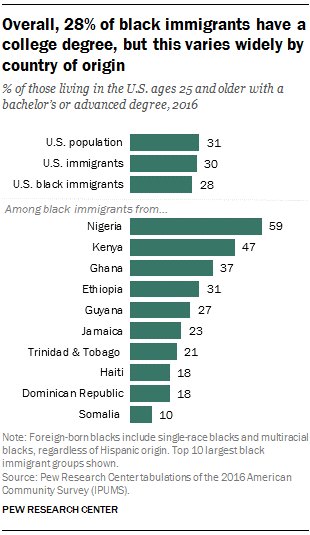 [For Black History Month, we invited some of our alumni to provide their reflections as guest bloggers of the month. This post is from Emil Ovbiagele L’14.]
[For Black History Month, we invited some of our alumni to provide their reflections as guest bloggers of the month. This post is from Emil Ovbiagele L’14.]
The American story is an unfolding tale. A rich and diverse story still being crafted. There are chapters we ought to celebrate with fervent praise. There are pages where it hurts to look. And most importantly, there are more exciting narratives yet to be fully told.
Since the 1970s, February has been designated as Black History Month. But as America experiences seismic demographic changes, it is important to examine the breadth and depth of what constitutes black America. Specifically, the stories, struggles, and accomplishments of black immigrants, who as of 2016 account for 18% of the overall black American population, must be weaved into the unfolding American story.
Black History Month
The exploration of Black History as a bona fide area of scholastic pursuit was initially championed by Carter G. Woodson (December 1875-April 1950). Woodson was a distinguished author, editor, publisher and historian.
The philosophical integrity of Woodson’s quest, though simple, transcended time. Woodson was bent on ensuring that the achievement of black people factored into the discussions of human (America’s) progress and the making of a modern civilization. He called for an appreciation of the history of black Americans and acknowledgment of the role they played (and continue to play) in the making of today’s America. And today, that story must include an appreciation and exploration of the history, accomplishments, and plight of black immigrants in the United States.
History of Voluntary Black Migration
Black migration is a part of America’s history and burgeoning story. The transatlantic slave trade, which began in the 16th century ensured a sizable black population (one of those sad history pages were it hurts to look). However, the recent growth in America’s black population has its roots in a more recent development—voluntary black migration.
Today, about one in ten blacks in the United States are black immigrants. That translates to about 4.2 million people. Another 8% of blacks in America are second-generation Americans (persons born in the United States but having at least one-foreign born parent). The number of black immigrants in the United States has grown fivefold since 1980. Between 2010 and 2018, America’s immigrant population from sub-Saharan Africa increased by 52%.
Barriers to Black Migration
Black immigrants, like many people of color in the United States, are not spared by policies that have a disparate and disproportionate impact on them.
As far back at the 1920s, the enforcement of several national origin quota laws (Quota Act of 1921 and the Immigration Act of 1924) disproportionately impacted African immigrants. Although, these laws were aimed at restricting immigration of Jews and Catholics from Southern and Eastern Europe, and immigration from Asia, these laws also effectively excluded immigrants of African descent. Under the restrictive immigration laws of the 1920s, immigrants from Africa (excluding Egypt) totaled 1,100, compared to 51,227 from Germany.
But the disparate treatment of black immigrants and access to the American dream isn’t a phenomenon relegated to the past. More recent examples abound. In 2017, President Trump vented about the growing number of African immigrants in the United States. He complained about Nigerian immigrants who would never “go back to their huts.” He wondered out loud why the United States allowed people from Haiti, El Salvador, and African countries, countries the President dubbed as “sh*thole countries.” Instead, the President suggested that the United States allowed more immigration from majority-white Scandinavian countries like Norway.
In January 2020, the President signed a proclamation into law that would restrict immigration to the United States from certain African countries under the guise of “terrorism” concerns. From rhetoric to action, the Trump Administration continues to foster and promote immigration policies rife with the drippings of xenophobia.
Positive Impact of Black Immigrants
Despite recent, blatant, and systemic attempts to undermine the impact of and exclude black immigrants, the data tells a different story and highlights the importance of this group of people to America’s continued success as a nation. It tells a tale of people who represent the best parts of this country and the purer ideals on which America was founded.
 Many Black immigrants continue to push the boundaries of excellence in various fields from the sciences to the arts. They’ve become our doctors, nurses, lawyers, writers, professors, athletes, actors, and entrepreneurs. They are our DREAMERS NEXT DOOR. The likes of Geutty Felin, Dikembe Mutombo, Chimamanda Adichie, K’naan, Lupita Nyong’o, Wyclef Jean, Chinua Achebe, Chiwetel Ejiofor, Uzo Aduba, and (Marquette Law alum) Isioma Nwabuzor come to mind.
Many Black immigrants continue to push the boundaries of excellence in various fields from the sciences to the arts. They’ve become our doctors, nurses, lawyers, writers, professors, athletes, actors, and entrepreneurs. They are our DREAMERS NEXT DOOR. The likes of Geutty Felin, Dikembe Mutombo, Chimamanda Adichie, K’naan, Lupita Nyong’o, Wyclef Jean, Chinua Achebe, Chiwetel Ejiofor, Uzo Aduba, and (Marquette Law alum) Isioma Nwabuzor come to mind.
Black immigrants of African descent are more likely than the overall American population to have a college degree or higher (e.g. 59% of foreign-born blacks from Nigeria have a bachelor’s or advanced degree—this is double that of the overall population). They participate at a higher rate in the labor force compared to all other immigrant groups and the population at large. Like with most immigrants, they carry with them the essence of the American spirit.
Black History month is a celebration and acknowledgment of a people. It is a celebration of a melting pot of people, who pledge allegiance to and believe in the fundamental ideals upon which our country was built. We are a nation of immigrants. We are a nation of black immigrants, whose impact, struggles, history, and stories embody the American spirit.
Black immigrants make up a part of the history we celebrate. They share in the dreams and contribute to the aspirations of our great nation. They are an important part of the modern American story.

Impressive list of African immigrant achievements. Sub-Saharan Africans bring new religious and cultural vitality to America.
I question the difference and ensuing impact “voluntary” black immigrants have had on the American culture and way of life since 1965 compared to the effects of “involuntary” black immigrants. The statistics focus on “voluntary” black immigrant achievement in non-traditional professions not typically filled with “involuntary” black immigrants. Should this be a much larger discussion within the black community to better focus U.S. government tax dollars on meeting the needs of “involuntary” black immigrants negatively impacted by slavery and the early Jim Crow era? There is room within the black race in America for the former (voluntary) to openly recognize the disparities caused by the very different historical experiences and change the black life trajectory in America.